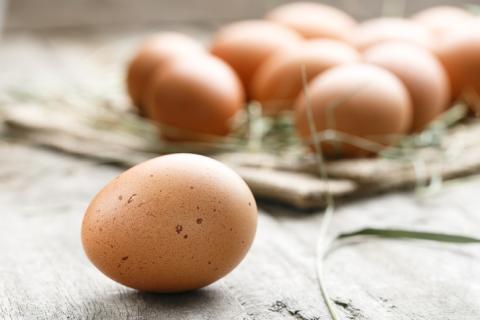Egg Safety for Easter and Year-Round
For years, dietitians recommended that people eat eggs only sparingly, as eggs are very high in cholesterol. However, the recommendations have evolved in recognition of a less straightforward connection between dietary cholesterol (cholesterol we consume in food) and our blood cholesterol level. In 2015, the U.S. Dietary Guidelines dropped the recommendation to avoid eggs, and instead advised eating them as part of a healthy diet. A 2018 study published in the journal Heart even found that eating an egg each day could lower the risk of cardiovascular disease!
The debate continues, with the pendulum swinging the other way when a March 2019 study from Northwestern University claimed that egg consumption actually raises the risk of cardiovascular disease. The research team didn’t recommend completely banishing eggs from our diet. Study author Wenze Zhong noted that eggs are a good source of important nutrients such as essential amino acids, iron and choline. Eat them in moderation, Zhang recommends.
Experts aren’t in total agreement about the new study. So whose advice should health-conscious consumers follow? The best person to ask is your doctor.
Egg safety for seniors, part 2
There’s one more egg-safety issue to consider. It’s important to handle and cook eggs safely to avoid exposure to Salmonella, a germ that is a leading cause of foodborne illness (commonly called food poisoning). Symptoms of Salmonella poisoning include diarrhea, fever and abdominal cramps. The illness caused by Salmonella can be especially dangerous for older adults, resulting in high fever, vomiting, dehydration and even death.
To avoid contracting Salmonella, follow these tips from the Center for Disease Control and Prevention (CDC):
- Consider purchasing pasteurized eggs.
- Keep eggs refrigerated at 40° or cooler at all times.
- Discard cracked or dirty eggs.
- Wash your hands, cutting board and other utensils after handling raw eggs.
- Cook eggs until both the yolk and white are firm.
- Dishes prepared with raw or lightly cooked eggs (e.g., Caesar salad dressing or homemade ice cream) should be made with pasteurized eggs.
- Refrigerate dishes made with eggs promptly after cooking.
What about the traditional Easter egg hunt? The American Egg Board says that when dyeing eggs, wash your hands between each step of cooking, dyeing and cooling. Put the eggs back in the fridge once you’re done decorating them. If you have a traditional Easter egg hunt, eggs should go back into the fridge within two hours. Otherwise, it’s safest to discard them, to protect people of every age. Eggs that are cracked during the hunt should also be discarded.
The information in this article is not intended to replace the advice of your healthcare provider. Talk to your doctor about a diet that is right for you, and about your risk of foodborne illness.
